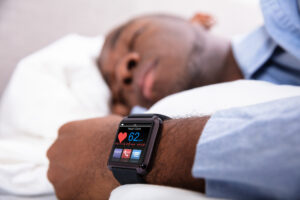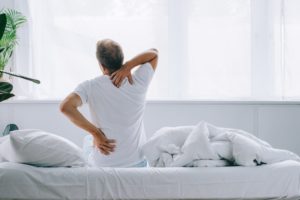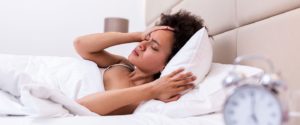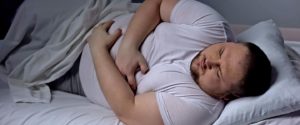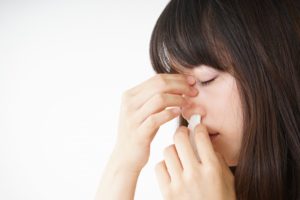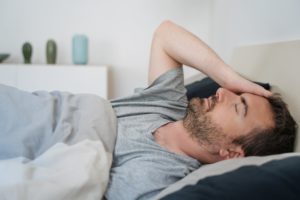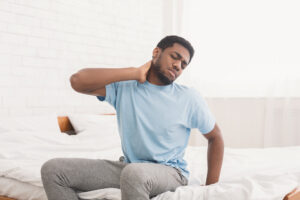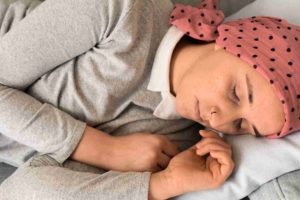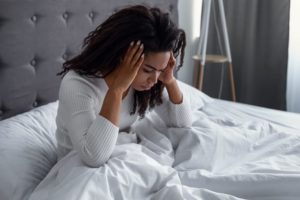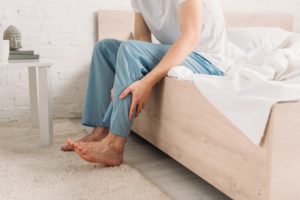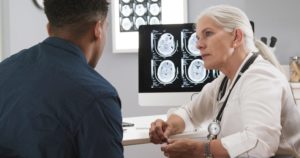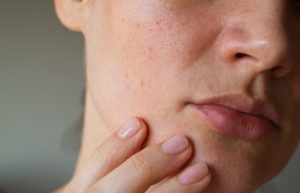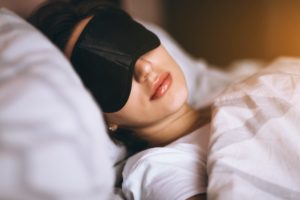When you buy through our links, we may earn a commission. Products or services may be offered by an affiliated entity. Learn more.
Hypnic Headache (Alarm Clock Headache)
- Symptoms: A hypnic headache is one that wakes you up, typically in the middle of the night, and feels like a dull or throbbing pain, depending on severity.
- Causes: Though the exact cause is still unknown, hypnic headaches may be linked to changes in sleep-related brain activity, melatonin levels, or abnormal blood vessel behavior.
- Treatment: If you’re diagnosed, a doctor may prescribe caffeine before bed, lithium, indomethacin, or melatonin supplements to help prevent nighttime episodes.
If you’ve ever been woken up by a headache in the middle of the night, you may have experienced what’s known as a hypnic headache. Hypnic headaches are considered rare, affecting fewer than 1% of people. But if you’re someone who has been diagnosed with this specific type of headache, you know that they can be extremely frustrating.
What Are Hypnic Headaches?
Hypnic headaches are a rare type of headache that occurs during sleep and wakes the person up, which is why they’ve earned the nickname “alarm-clock headaches” . The pain can keep people up for at least 15 minutes, if not longer.
Hypnic headaches only occur while a person is sleeping. This timing distinguishes them from other types of headaches, such as migraines or cluster headaches, which may cause difficulty falling asleep but can occur at any time of day.
People who experience hypnic headaches typically have them several times a week. The onset of hypnic headache typically occurs after age 50 years, though a few cases younger than age 40 years have been reported.
Looking to improve your sleep? Try upgrading your mattress.
Hypnic Headache Symptoms
Hypnic headaches have a distinct symptom profile that sets them apart from other types of headaches. These include:
- Dull or throbbing pain affecting one or both sides of the head
- Waking up in the middle of the night due to headache, multiple times a month
- Nausea
- Sensitivity to light or sounds
- Runny eyes or nose
The primary symptom of a hypnic headache is dull or throbbing head pain that occurs during sleep, multiple times per month, usually around the same time of night. Hypnic headaches can be unilateral or bilateral, which means they can affect one or both sides of your head. However, it’s more common for a hypnic headache to affect both sides.
Another distinguishing feature of hypnic headaches is that they usually occur in the middle of the night, or around two to three hours after falling asleep. They often occur around the same time and may even happen multiple times per night , lasting for 15 minutes to four hours. Hypnic headaches can range in severity, but they’re painful enough to rouse you from sleep.
Hypnic Headache Causes
Hypnic headaches are considered a primary headache disorder, which means they’re not caused by a known underlying condition. Hypnic headaches often occur during rapid eye movement (REM) sleep, so it’s possible that an area of the brain involved with processing pain gets activated, leading to a hypnic headache. Beyond that, researchers don’t know for sure what causes hypnic headaches.
Hypnic headaches may also be linked to melatonin production. Melatonin is a hormone that makes you feel sleepy, and its production levels rise and fall throughout the day in line with your circadian rhythm (sleep-wake cycle). Because hypnic headaches occur at the same time each night, some researchers believe there may be a disturbance to the underlying rhythms that regulate melatonin production, which causes lower melatonin levels and, subsequently, hypnic headaches.
Part of the evidence supporting this theory comes from the efficacy of lithium in treating hypnic headaches, since lithium is effective in treating other chronobiological disorders and helps increase melatonin levels.
Risk Factors
Older adults and women are more likely to get hypnic headaches. Over 90% of people experience their first hypnic headache after age 50, with an average age of onset of 62 years old. Women are between 1.5 to two times more likely to have hypnic headaches than men.
It usually takes a long time from onset of headaches to a diagnosis of hypnic headaches, which may skew the ages of those who have them to be older. On average, people don’t receive a diagnosis until seven years after their first hypnic headache. This is because various other more common causes of headache need to be considered first.
Diagnosing Hypnic Headaches
Diagnosing hypnic headaches can be challenging, as they’re rare and share symptoms with other types of headaches. There’s no single test that can confirm a hypnic headache, so diagnosis relies heavily on a detailed clinical evaluation and a process of exclusion.
A doctor will begin by reviewing the patient’s medical history and asking detailed questions about their headache patterns. Key characteristics that point to hypnic headaches include:
- Headaches that occur exclusively during sleep
- Headaches that wake the person up, typically at the same time each night
- Symptoms present in individuals over the age of 50
- Headaches that last between 15 minutes and 4 hours
It’s also important to assess for the absence of other neurological symptoms, like visual disturbances or muscle weakness, which might indicate a different condition. Since several other disorders can cause headaches while sleeping, doctors will often recommend tests to rule out secondary causes. These may include:
- MRI or CT scans to check for brain abnormalities, tumors, or lesions
- Polysomnography, or sleep study, to identify sleep-related issues like sleep apnea
- Blood tests to rule out infection, inflammation, or metabolic disorders
Treatment of Hypnic Headaches
Because hypnic headaches are relatively rare and typically occur in older adults, treatment focuses on both prevention and symptom relief. Unlike other headache disorders, hypnic headaches have a unique profile that often responds well to certain medications not commonly used for other headache types.
Caffeine Before Bed
Caffeine—in the form of a cup of coffee, caffeinated tea, or caffeine tablets (typically 40 to 60 mg)—is considered to be the most effective treatment for hypnic headaches. It sounds counterintuitive, but a caffeine pill can help people with hypnic headaches sleep reduce their symptoms. It also has relatively minimal side effects, especially when compared with other medications for hypnic headaches.
However, regular use of caffeine pills and pain relievers can lead to medication overuse headaches, a type of rebound headache caused by excessive use of medications. Always speak to your healthcare provider before taking new medications as they can recommend the right timing, dosage, and type of medication for your situation.
Medications
Several medications have been shown to be effective in preventing hypnic headaches:
- Lithium: Often used for bipolar disorder, lithium carbonate can reduce the frequency and severity of hypnic headaches. However, lithium requires careful monitoring due to potential side effects and drug interactions.
- Indomethacin: This nonsteroidal anti-inflammatory drug (NSAID) has been helpful for some patients. It works by reducing inflammation and relieving pain but can cause stomach irritation with long-term use.
- Melatonin: As a natural hormone that regulates sleep-wake cycles, melatonin may help some people with hypnic headaches, especially those with sleep disturbances.
- Topiramate or Verapamil: These medications, often used for migraine prevention, may be tried if other treatments fail.
When to Talk to Your Doctor
If you’re regularly waking up in the middle of the night with headaches, it’s important to speak with a healthcare professional—especially if the headaches are severe, disrupt your sleep, or follow a consistent pattern. While hypnic headaches are rare, they share symptoms with other potentially serious conditions such as sleep apnea, high blood pressure, or brain tumors, making a proper diagnosis essential.
You should contact your doctor if:
- You experience new or unusual headaches that wake you up from sleep.
- The headaches occur frequently or at the same time each night.
- You notice other neurological symptoms like confusion, vision changes, or weakness.
- Over-the-counter pain relievers are ineffective or required often.
- You have a personal or family history of migraines or other headache disorders.
Early evaluation and treatment can improve your quality of life and help rule out more serious health issues. A doctor may refer you to a neurologist or recommend a sleep study to better understand what’s causing your nighttime headaches.
Frequently Asked Questions
Are hypnic headaches dangerous?
Hypnic headaches are typically not dangerous, but they can significantly disrupt sleep and affect quality of life. While they are not associated with serious neurological conditions, it’s important to consult a doctor to rule out other potential causes of headaches at night, such as sleep apnea or high blood pressure.
How common are hypnic headaches?
Hypnic headaches are rare. They account for less than 0.1% of all headache disorders and are most commonly seen in people over the age of 50. Because they are so uncommon, they are often underdiagnosed or mistaken for other types of headaches.
What is the difference between cluster headaches and hypnic headaches?
While both types can occur at night, cluster headaches are extremely painful, often accompanied by eye watering or nasal congestion, and tend to come in cyclical patterns. Hypnic headaches, on the other hand, are generally milder, occur exclusively during sleep, and lack the intense, one-sided pain and autonomic symptoms seen in cluster headaches.

Still have questions? Ask our community!
Join our Sleep Care Community — a trusted hub of sleep health professionals, product specialists, and people just like you. Whether you need expert sleep advice for your insomnia or you’re searching for the perfect mattress, we’ve got you covered. Get personalized guidance from the experts who know sleep best.
References
9 Sources
-
Lanteri-Minet M. Hypnic headache. Headache. 2014;54(9):1556-1559. doi:10.1111/head.12447
https://pubmed.ncbi.nlm.nih.gov/25231430/ -
Evers S, Goadsby PJ. Hypnic Headache. Practical Neurology. 2005;5(3):144-149.
https://pn.bmj.com/content/5/3/144 -
Lanteri-Minet, M., & Donnet, A. (2010). Hypnic headache. Current Pain and Headache Reports, 14(4), 309–315.
https://pubmed.ncbi.nlm.nih.gov/20512536/ -
Holle D, Naegel S, Obermann M. Hypnic headache. Cephalalgia. 2013;33(16):1349-1357. doi:10.1177/0333102413495967
https://pubmed.ncbi.nlm.nih.gov/23832130/ -
Escudero Martínez, I., González-Oria, C., Bernal Sánchez-Arjona, M., & Jiménez Hernández, M. D. (2015). Description of series of 10 patients with hypnic headache: Discussion of the diagnostic criteria. Neurologia (Barcelona, Spain), 30(4), 195–200.
https://pubmed.ncbi.nlm.nih.gov/24953414/ -
Silva-Néto, R. P., Santos, P., & Peres, M. (2019). Hypnic headache: A review of 348 cases published from 1988 to 2018. Journal of the Neurological Sciences, 401, 103–109.
https://pubmed.ncbi.nlm.nih.gov/31075680/ -
American Academy of Sleep Medicine. (2014). The International Classification of Sleep Disorders – Third Edition (ICSD-3). Darien, IL.
https://aasm.org/ -
Cajochen, C., Kräuchi, K., & Wirz-Justice, A. (2003). Role of melatonin in the regulation of human circadian rhythms and sleep. Journal of Neuroendocrinology, 15(4), 432–437.
https://pubmed.ncbi.nlm.nih.gov/12622846/ -
Liang JF, Wang SJ. Hypnic headache: a review of clinical features, therapeutic options and outcomes. Cephalalgia. 2014;34(10):795-805. doi:10.1177/0333102414537914
https://pubmed.ncbi.nlm.nih.gov/24942086/







